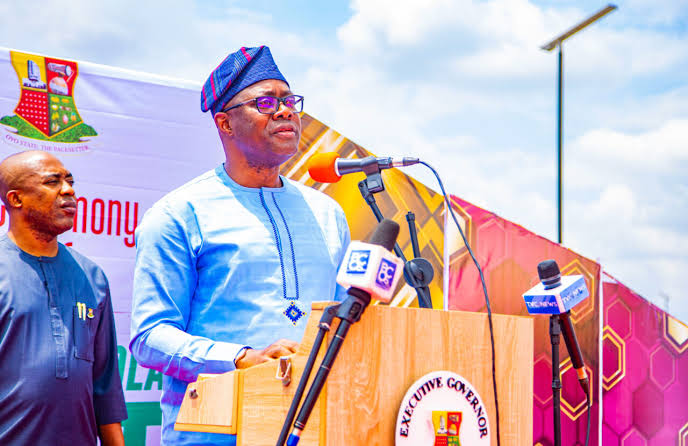News
Anyone Holding PDP Back Should Leave — Makinde Fires Back At Atiku’s Defection, Calls For Reforms In Traditional Leadership System

…Makinde says PDP is bigger than individuals, pushes constitutional role for monarchs at Deji of Akure’s 10th coronation
Governor Seyi Makinde of Oyo State has dismissed concerns over the recent resignation of former Vice President and presidential candidate, Alhaji Atiku Abubakar, from the Peoples Democratic Party (PDP), stating that the party remains a strong political institution not beholden to any single individual.
Speaking in Akure, the Ondo State capital, during the 10th coronation anniversary celebration of the Deji of Akure, Oba Aladetoyinbo Aladelusi, Governor Makinde reiterated that political affiliations are based on interest, and anyone stalling the progress of the PDP is better off leaving.
“Politics is a game of interest. I don’t think that will make any dent on the PDP as a party,” the governor said when asked by journalists about Atiku’s defection. “The Peoples Democratic Party is an institution. We have freedom of entrance and exit. Anyone that will hold PDP down—it is better for such an individual to quit.”
Governor Makinde also played down concerns about the threat posed by the African Democratic Congress (ADC), stating that the political landscape remains dynamic and that citizens are free to align with platforms that resonate with their expectations of governance.
“I don’t see ADC as a threat to the PDP. The goal is essentially the same—if you are dissatisfied with the pace or direction of governance, you have the right to associate and contribute where you see fit,” he said.
Emphasizing the importance of long-term national interest above personal ambitions, the governor remarked: “Players will come and go, governors will come and go, presidents will come and go—but our state and country will remain. That is what should matter most.”

Makinde Advocates Constitutional Reforms for Traditional Rulers
Delivering a keynote lecture at the colloquium titled “The Role of Nigeria’s Traditional Institutions in Nation Building: Impediments, Impacts, and Prospects,” Makinde used the occasion to advocate for a constitutional role for traditional rulers in Nigeria’s governance framework.
According to him, the traditional institution plays a pivotal role in community development, intelligence gathering, and conflict resolution and should not be left to operate in ambiguity or ceremonial redundancy.
“In Oyo State, we have taken deliberate steps to strengthen the integration of traditional institutions into the governance architecture,” he explained. “Our royal fathers are not bystanders. They serve as first responders, sources of local intelligence, and advocates for peace.”
Makinde revealed that his administration has legally institutionalized the roles of traditional leaders in the state’s security council and passed laws to clarify chieftaincy succession procedures.
“We passed laws to remove ambiguity around succession and throne ascension. The result? Fewer legal disputes, reduced communal tension, and increased legitimacy for traditional rulers,” he noted. “This clarity has created a more stable traditional system that complements our modern governance.”
Calling for stronger partnerships, the governor stressed: “We need smarter collaborations between the old and the new—between the modern office and the ancient throne, between the oba’s palace and government policies.”
Recommended News:
- Why Atiku Keeps Switching Parties: The Politics Behind Five Major Defections
- ‘APC Won’t Win Osun, Oyo’ — Makinde Backs Adeleke
- BREAKING: Atiku Abubakar Quits PDP, Cites Party Drift From Founding Ideals
Akure Monarch, Scholars, Legal Experts Back Makinde’s Call
In his address of appreciation, the Deji of Akure, Oba Aladetoyinbo Aladelusi, thanked the governor for attending the event and echoed his call for a constitutional role for traditional institutions. He described traditional rulers as vital custodians of peace and unity, deserving of legal and institutional backing to contribute meaningfully to nation-building.
“Akure remains a town without division,” the monarch noted, praising the synergy between the palace, government, and the people of the ancient city.

Adding an academic perspective, Professor Adedayo Afe, a historian from Adekunle Ajasin University, Akungba-Akoko, emphasized the need for chieftaincy succession laws to be enshrined in Nigeria’s constitution rather than being left solely to state legislation. According to him, this would help curb what he described as the “overbearing tendencies of governors over traditional institutions.”
Afe also advocated for the establishment of a formal law recognizing Paramountcy in Ondo State, to create a more structured and respected leadership hierarchy among traditional rulers.
In the same vein, the Attorney General and Commissioner for Justice in Ondo State, Mr. Kayode Ajulo, SAN, lent his voice to the conversation, calling for a broader legal recognition of Nigeria’s cultural heritage and traditional practices.
“The constitution should accommodate and recognize culture and traditions,” Ajulo said. “Beyond recognition, our traditional rulers must also be funded, empowered, and trained in areas such as conflict resolution, mediation, and community mobilization.”
Nation-Building Through Inclusion
The colloquium, which formed part of the celebration marking a decade on the throne for Oba Aladelusi, served as a thought leadership platform, bringing together stakeholders from the political, academic, and legal communities to discuss the intersection of traditional authority and modern governance.
Governor Makinde’s remarks were widely applauded as timely and forward-thinking, especially in the context of increasing calls for decentralization and stronger community-based governance models in Nigeria.
As the country grapples with evolving security challenges, governance complexities, and socio-cultural shifts, the integration of traditional rulers into the constitutional structure may yet prove to be a transformative step in deepening Nigeria’s democratic and developmental journey.






















Pingback: Wike’s Aide Takes Jab At Atiku Over Presidential Ambition: “Was It Doctor-Prescribed?” - Eaglesforesight
Pingback: RIDSCo, Axxela, Lafarge Champion Commissioning of Ultra-Modern Isoso Police Station in Sagamu - Eaglesforesight